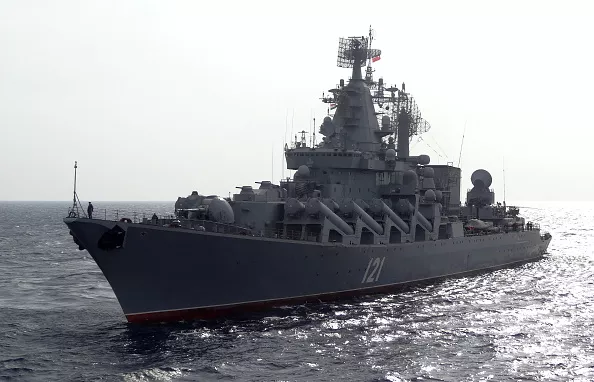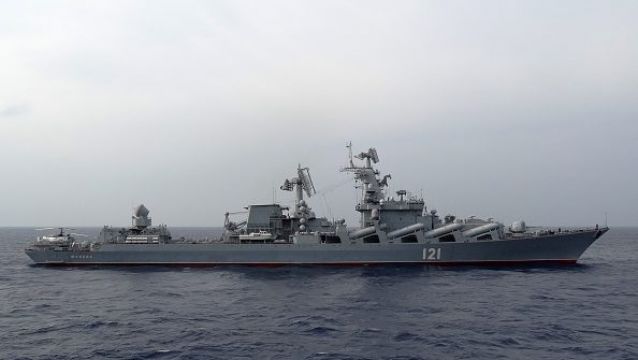Russia has confirmed the Moskva warship and missile cruiser, the flagship of its Black Sea Fleet, has sunk while being towed to port following what it said was a fire and explosions involving ammunition stowed onboard.
Ukraine says the Moskva's fate was sealed by a missile strike launched by its forces from the coast which ripped open the hulking Soviet-era ship's hull. Russia's defence ministry has not confirmed that version of events. Reuters is unable to verify either side's assertions.
Here's what we do know, and what the sinking means (and does not mean) for Russia's battle-readiness.

What is the history of the Moskva warship?
The Moskva first entered service with the Soviet navy in 1983 after being built in then-Soviet Ukraine and was called "Slava" or "Glory" at the time. It was renamed Moskva (Moscow) in 1995 after the fall of the Soviet Union.
The ship provided security for a meeting of Soviet leader Mikhail Gorbachev and US president George Bush in Malta in December 1989.
Russian president Vladimir Putin has also held meetings on board with world leaders.
The Moskva briefly took part in a blockade of the Ukrainian navy in March 2014 as part of Russia's annexation of Crimea.
In 2015, it took part in Russia's military operation in Syria, providing air defence for Russian forces there.

What capabilities does the sinking deprive Russia of?
Russia has powerful air defence systems deployed in Crimea, which it seized from Ukraine in 2014, but the Moskva was able to provide long-range and mobile air defence protection for the entire Black Sea Fleet and was a floating command and control centre. Its loss potentially leaves the fleet more exposed, particularly on longer range missions west of Crimea.
The ship was armed with multiple anti-ship and surface-to-air missiles. Russia has two other ships of the same class, the Marshal Ustinov and the Varyag, which serve with Russia's Northern and Pacific fleets respectively.
The ships were designed in the Soviet Union in the late 1970s to counter US aircraft carrier groups and to provide air defence to Soviet vessels operating in distant oceans. They were nicknamed "carrier killers" at the time.

What happened to the crew of the Moskva?
The ship had a crew of around 500 sailors who Russia said were successfully evacuated to other ships before being returned to their home port of Sevastopol in Crimea on Friday. Ukraine has suggested there are likely to have been fatalities, but Russia has not said anything on the subject yet.
Will the loss change the course of the war?
Probably not, but Britain's ministry of defence says its loss is likely to prompt Russia to review its naval posture in the Black Sea. While a huge blow to Russian military morale, the Russian navy has so far not played a big role in what Moscow calls its "special military operation" in Ukraine.
Russia retains naval dominance in the immediate region and the Moskva was primarily equipped to destroy enemy vessels at sea but little is left of Ukraine's navy.
"The ship is really very old. Actually, there have been plans to scrap it for five years now," Russian military analyst Alexander Khramchikhin said.
"It has more status value than real combat value, and in general, had nothing to do with the current operation. It will have no effect on the course of hostilities."
Russia has sufficient resources to maintain a blockade of Ukrainian ports and to hit targets inside Ukraine with other missile systems.

Did the Russians have a role for it in the unfolding conflict?
Not clear, but some analysts say it may have helped support a possible Russian amphibious landing in the Ukrainian port of Odessa that has not happened yet because of resistance from Ukrainian forces.
Its sinking may be seen in some quarters in Ukraine as reducing the chances of such an assault and allow Ukraine to redeploy some of its forces elsewhere.
Can Russia easily replace the Moskva warship?
No. Russia has two other ships of the same class, the Marshal Ustinov and the Varyag, which serve with Russia's Northern and Pacific fleets respectively. Turkey, which controls access to the Black Sea via the Bosphorus, will not let them enter at a time of war.
Was the Moskva armed with unique weapons?
No. It had anti-ship missiles and surface-to-air missiles, but was not equipped with Russia's latest generation Kalibr cruise missiles or hypersonic missiles.

How modern a warship was it?
Not very. Designed in the 1970s Soviet Union during the Cold War, it was conceived to destroy US aircraft carriers and had been in service for nearly four decades.
It underwent an extensive refit, and according to Britain's ministry of defence, only returned to operational status in 2021. Despite that refit, some of its hardware remained outdated.
How big a blow is the sinking to Russian military pride?
It's a bitter loss for the Russian military as the Moskva warship, though ageing, was a symbol of the Crimea-based Black Sea Fleet and of Russian military pride.
If it was holed by Ukrainian anti-ship missiles, it would be the biggest Russian warship to be lost in action since 1941, when German dive bombers crippled the Soviet battleship Marat in Kronshtadt harbour. Western diplomats and experts expect senior officers in the Black Sea Fleet to lose their jobs over the sinking.
Whatever the cause, the episode is a setback for Russia.







